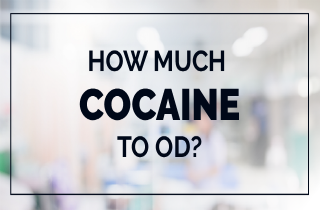What provokes a cocaine overdose? Starting from dosage to overdose complications and signs of overdose, we review signs, symptoms, and prognosis for cocaine overdose. Stay with us and we invite you to ask your personal questions about cocaine overdose or risks of snorting cocaine at the end.
How does unintentional cocaine overdose happen?
Cocaine is a crystalline alkaloid obtained from the leaves of the coca plant. Because cocaine is highly addictive, cocaine is significantly more dangerous compared to other central nervous system stimulants (including the entire class of amphetamine drugs). So, when we talk about overdose, the best way to describe cocaine overdose is using the term “intoxication”, which manifest as immediate effects of too much cocaine in the system.
Cocaine overdose – How much is too much?
Common doses of cocaine vary between 10-120 mg. The estimated minimal lethal dose of cocaine is 1.2 g, but individuals with hypersensitivity to cocaine have died from as little as 30 mg. Still, this is usually not the case with cocaine addicts, who develop a high tolerance to cocaine in the central nervous system. In fact, some cocaine addicts with considerable tolerance have reported that they can tolerate up to 5 g of cocaine daily.
Cocaine overdose complications
The biggest risk with most drug overdose is that people do not take as recommended. But that is not the case with cocaine. In fact, most cocaine deaths are accidental, usually because some of its effects increase risk of pre-existing health conditions, such as the elevated blood pressure. Additionally, repeated doses of cocaine administered to avoid the crash that often follows the initial intense euphoric effects put you at risk of overdose. Cocaine overdose also occurs when used in combination with other drugs such as a cocaine and alcohol mix.
The most common signs of cocaine OD include:
- abdominal pain
- agitation
- cerebral hemorrhage
- chills
- convulsions
- death from respiratory failure
- delirium, unconsciousness
- enhanced reflexes
- hallucinations
- headache
- heart failure
- hostility
- irregular respiration
- nausea
- rise in body temperature
- seizures
- stroke
- tachycardia
- vomiting
Cocaine overdose prognosis
The prognosis of cocaine overdose depends on many factors. Overdose from cocaine can be a very painful experience, among other things. And it takes time for the body to return to its stable condition after you OD. The body requires time to not only metabolize cocaine, but to normalize additional symptoms. For example, depression with suicidal ideation may develop in very heavy users.
There is no officially approved specific antidote for cocaine overdose. Emergency treatment for cocaine overdose often consists of administering a benzodiazepine sedation agent, such as diazepam (Valium) to decrease the elevated heart rate and blood pressure. In order to treat hyperthermia the physical cooling method (ice, cold blankets, etc…) may be used. There are specific treatments developed for any further complications.
Cocaine overdose death rate
High doses of cocaine due to the effects on sodium channels can cause cardiac attack.
Unlike other drugs, cocaine has certain qualities that make it cross the blood-brain barrier quickly, which can lead to brain shutdown.
Statistics indicate that 100 people die per day from drug overdoses each day in USA. After marijuana, cocaine is the second most used illicit drug in USA and causes three times more death rates than any other illicit drug. In fact, nearly 500,000 cocaine users visit the ED due to cocaine overdose annually; over 7,000 of them are fatalities.
Let’s verify your coverage for treatment at an American Addiction Centers location. Your information is always confidential.
Cocaine overdose amount questions
Do you still have questions about cocaine OD? Please feel free to post your questionsin the comments section below. We will be happy to provide you with a personal and prompt response as soon as possible.









Related Posts